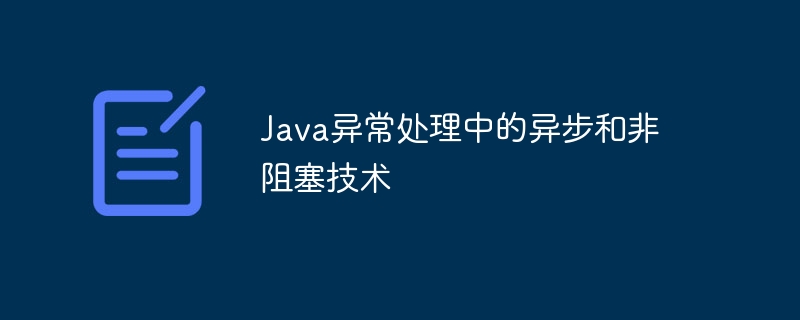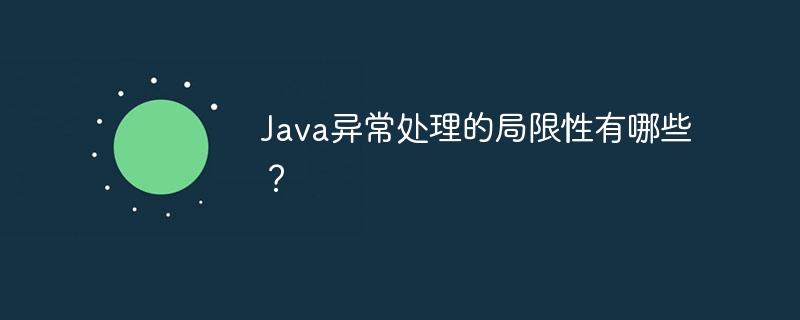
Java exception handling has always been an important issue that programmers need to face. PHP editor Yuzai has carefully compiled an ultimate guide for everyone, from novice to master, and gradually explores all aspects of Java exception handling. Whether you are a beginner or an experienced Java developer, this guide will help you better understand and use the exception handling mechanism and improve your technical level in Java programming. Let's explore the mysteries of Java exception handling together!
Beginner’s Guide
- Understand exceptions: Exceptions are errors or abnormal conditions encountered during program execution.
-
Handling exceptions: Use the
try-catchblock to catch and handle exceptions. -
Throw an exception: Use the
throwkeyword to throw an exception to indicate an error. -
Exception types: Common exception types include
NullPointerExcept<strong class="keylink">io</strong>n,IndexOutOfBoundsExceptionandArithmeticException.
Intermediate Guide
- Custom exceptions: Create your own exception class to handle specific types of errors.
-
Exception chain: Use the
getCause()method to access the original exception that caused the exception. -
Stack trace: Use the
printStackTrace()method to print the exception stack trace. - Exception Log: Use Log Recording Framework Log exception information for debugging and troubleshooting.
Advanced Guide
- Exception handling best practices: Follow best practices such as using specific exception types, avoiding excessive catching of exceptions, and using resource managers to prevent resource leaks.
- Concurrent programming and exceptions: Consider concurrency issues when handling exceptions in a multi-threaded environment.
- Assertions and Exceptions: Use assertions to verify the internal state of your program and throw exceptions to indicate errors.
- Lambda Expressions and Exceptions: Understand how lambda expressions affect exception handling.
Master exception handling
- Master exception types: In-depth understanding of various exception types and their uses in Java.
- Master Exception Chaining: Effectively use exception chaining to diagnose and resolve root causes.
- Optimize exception handling performance: Understand the impact of exception handling on program performance and take measures to optimize .
- Use third-party exception handling libraries: Explore the enhanced exception handling capabilities provided by third-party libraries.
- Exception handling design patterns: Apply design patterns, such as strategy pattern and chain of responsibility pattern, to improve the scalability of exception handling.
case study
Learn how to apply exception handling concepts in real-world scenarios:
- Exception handling in file I/O operations: Elegantly handle exceptions in file read and write operations.
- Exception handling in database operations: Handling Database Exceptions in connection, query and update operations.
- Exception handling in Web services: Create robust WEB services that can handle various exceptions.
in conclusion
By following this guide, developers can gain a deeper understanding of Java exception handling and grow from beginner to master. Mastering exception handling skills is crucial as it enables developers to write robust, reliable, and maintainable code, thereby improving the quality and stability of applications.
The above is the detailed content of The Ultimate Guide to Java Exception Handling: From Novice to Master. For more information, please follow other related articles on the PHP Chinese website!
 Java中的AssertionError异常的意义和用法Jun 25, 2023 am 08:47 AM
Java中的AssertionError异常的意义和用法Jun 25, 2023 am 08:47 AM在Java开发过程中,异常处理一直是一个十分重要的话题。当代码发生异常时,程序往往需要通过异常处理来捕获和处理异常,从而保证程序的稳定性和安全性。其中一个常见的异常类型就是AssertionError异常。本文将介绍AssertionError异常的意义和用法,帮助读者更好地理解和应用Java异常处理。一、AssertionError异常的意义Asserti
 Java中的ClassNotFoundException异常的常见原因是什么?Jun 24, 2023 pm 11:44 PM
Java中的ClassNotFoundException异常的常见原因是什么?Jun 24, 2023 pm 11:44 PMJava中的ClassNotFoundException异常是开发中的常见问题之一。在Java的开发中,通过类名来获取类的实例是一种非常常见的做法,但是如果找不到要加载的类,就会抛出ClassNotFoundException异常。那么,ClassNotFoundException异常的常见原因是什么呢?类路径不正确在Java中,当需要加载某个类的时候,JV
 Java中的NoSuchFieldException异常是如何产生的?Jun 25, 2023 pm 04:30 PM
Java中的NoSuchFieldException异常是如何产生的?Jun 25, 2023 pm 04:30 PMJava是目前世界上使用最广泛的编程语言之一,而在Java编程过程中,异常处理是非常重要的一环。本文将会介绍Java中的NoSuchFieldException异常,它是如何产生的以及如何处理它。一、NoSuchFieldException异常的定义NoSuchFieldException是Java中的一种Checked异常,表示在没有发现指定的字段时抛出的
 Java异常处理中的异步和非阻塞技术May 01, 2024 pm 05:42 PM
Java异常处理中的异步和非阻塞技术May 01, 2024 pm 05:42 PM异步和非阻塞技术可用于补充传统异常处理,允许创建更具响应性和高效的Java应用程序:异步异常处理:在另一个线程或进程中处理异常,允许主线程继续执行,避免阻塞。非阻塞异常处理:涉及在I/O操作出错时事件驱动的异常处理,避免阻塞线程,由事件循环处理异常。
 Java中的NoSuchFieldError异常该如何处理?Jun 25, 2023 pm 05:20 PM
Java中的NoSuchFieldError异常该如何处理?Jun 25, 2023 pm 05:20 PMJava是一种流行的高级编程语言,它使得开发人员能够轻松地创建各种应用程序。然而,正如其他任何编程语言一样,Java在编码过程中可能出现一些错误和异常。其中一个常见的异常是NoSuchFieldError。本文将介绍这种异常的原因、如何避免它以及如何处理它。NoSuchFieldError异常是什么?先来了解NoSuchFieldError异常。简单
 Java异常处理的局限性有哪些?Apr 11, 2024 pm 09:30 PM
Java异常处理的局限性有哪些?Apr 11, 2024 pm 09:30 PMJava异常处理的局限性包括:无法捕捉虚拟机和操作系统异常。异常处理可能掩盖更深层次的问题。嵌套异常难以调试。异常处理代码降低可读性。运行时检查异常会产生性能开销。
 Java中的NoSuchFieldException异常在什么场景下出现?Jun 25, 2023 am 11:51 AM
Java中的NoSuchFieldException异常在什么场景下出现?Jun 25, 2023 am 11:51 AMJava中的NoSuchFieldException异常指的是在反射过程中试图访问不存在的字段(Field)时抛出的异常。在Java中,反射可以让我们通过代码来操纵程序中的类、方法、变量等,使得程序具有更高的灵活性和扩展性。但是,在使用反射时,如果访问的字段不存在,则会抛出NoSuchFieldException异常。NoSuchFieldException
 SEO 优化Mar 28, 2024 am 09:46 AM
SEO 优化Mar 28, 2024 am 09:46 AM在当今数字时代,搜索引擎优化(SEO)对于任何业务在网上取得成功都至关重要。通过优化您的内容,您可以提高网站在搜索引擎结果页(SERP)上的排名,从而提高网站流量和转化率。页面内优化研究:确定与您的业务相关的相关,并在您的内容和代码中使用它们。标题标签:编写一个描述性且包含的标题标签,长度不超过60个字符。元描述:创建简洁且引人注目的元描述,长度不超过160个字符,包括并鼓励点击。标题:使用标题(H1-H6)来组织您的内容并包含。图像优化:使用描述性文件名和替代文本来优化图像,并确保图像大小适当


Hot AI Tools

Undresser.AI Undress
AI-powered app for creating realistic nude photos

AI Clothes Remover
Online AI tool for removing clothes from photos.

Undress AI Tool
Undress images for free

Clothoff.io
AI clothes remover

AI Hentai Generator
Generate AI Hentai for free.

Hot Article

Hot Tools

Notepad++7.3.1
Easy-to-use and free code editor

Atom editor mac version download
The most popular open source editor

Dreamweaver Mac version
Visual web development tools

Dreamweaver CS6
Visual web development tools

DVWA
Damn Vulnerable Web App (DVWA) is a PHP/MySQL web application that is very vulnerable. Its main goals are to be an aid for security professionals to test their skills and tools in a legal environment, to help web developers better understand the process of securing web applications, and to help teachers/students teach/learn in a classroom environment Web application security. The goal of DVWA is to practice some of the most common web vulnerabilities through a simple and straightforward interface, with varying degrees of difficulty. Please note that this software






